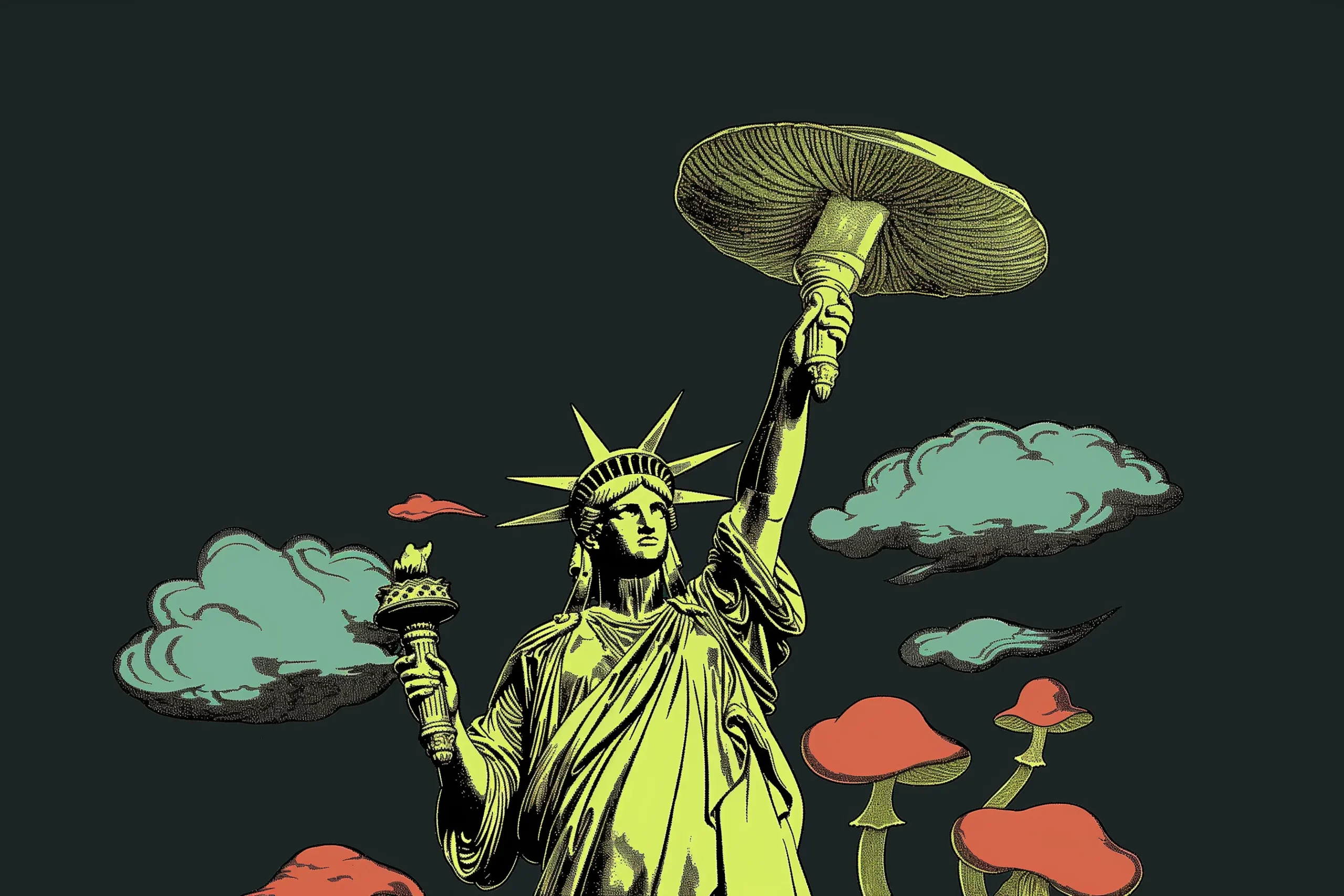In this week’s Psychedelic News Roundup, we cover American boxer and former heavyweight champion Deontay Wilder’s ayahuasca experience. Other news includes growing social use of psilocybin, new psychedelic studies, and more.
Deontay Wilder Feels ‘Reborn’ After Ayahuasca Experience

In an interview with The Telegraph, Deontay Wilder, an American heavyweight boxer, has declared himself “reborn” after undergoing an ayahuasca journey in Costa Rica. This revelation comes as he prepares for his upcoming fight against Joseph Parker in Saudi Arabia, on the same card as Anthony Joshua vs. Otto Wallin.
Wilder’s recent preparation included a retreat to the Rythmia facility in Costa Rica, where he took ayahuasca, a South American psychoactive brew containing Dimethyltryptamine (DMT). While DMT is a Schedule 1 drug in the US and therefore illegal, ayahuasca has been used by several notable individuals, including NFL player Aaron Rodgers and actors Will Smith and Megan Fox. Prince Harry also admitted to using it in therapy, but advised against recreational use.
Wilder, aged 38, shared his profound experience with ayahuasca, saying it was one of the most significant of his life. According to him, the journey has made him happier and more appreciative of the smallest things in life. He expressed his eagerness to continue this practice in the future.
Keep Up with Uncensored Psychedelic Trends
Join our newsletter at Psychedelics Uncensored.
We respect and protect your privacy. By subscribing your info will be subject to our privacy policy . Unsubscribe easily at any time
Wilder, who went on an impressive unbeaten run and became the WBC heavyweight champion, lost his title to Tyson Fury in 2020. Since then, his only fight has been a knockout victory over Robert Helenius in October 2022. Wilder’s comments come as part of his unique approach to mental and physical preparation for his return to the ring, underscoring a growing interest in alternative therapies among athletes.(1)
Mushrooms as a Social Drug: A Growing Trend

A recent article via Refinery29 explores the rising trend of microdosing psychedelic mushrooms as a social activity. The focus is on individuals who have incorporated microdosing into their social lives, favoring it over traditional alcoholic beverages. These users, like Jack, a 35-year-old tech worker, and Helena, a 31-year-old media professional in Los Angeles, are part of a growing number who find microdosing mushrooms a preferable alternative to alcohol.
The practice of microdosing, which involves taking a fraction of a typical psychoactive dose of substances like psilocybin, is gaining popularity among various demographics. Users report mental health benefits like reduced anxiety and depression, although more research is needed to confirm these effects. Microdosing is also seen as a fun activity that tweaks perception, making the world seem brighter and funnier without the intense experience of a full psychedelic trip.
This trend aligns with the sober-curious movement, especially among younger generations like Gen Z, who drink less. Mushrooms offer a way to socialize and relax without the hangovers or grogginess associated with alcohol. People like Helena have replaced drinking with microdosing, enjoying its effects without the negative after-effects of alcohol. Microdosing has been increasingly accepted in social settings, especially where traditional drug use is not prevalent. Helena’s experience demonstrates this shift, with even her 55-year-old aunt expressing interest in trying psilocybin. However, as Bryan Roth, MD, points out, there’s a challenge in controlling doses, and what is considered a “microdose” can vary significantly from person to person.
Keep Up with Psychedelic Trends
Get uncensored psychedelic news, events, and updates. Join Psychedelics Uncensored!
We respect and protect your privacy. By subscribing your info will be subject to our privacy policy . Unsubscribe easily at any time
Women, in particular, seem to be turning to psychedelics more than men, possibly as a response to inadequate treatment from the medical community for conditions like PTSD, depression, anxiety, and chronic pain. This shift is noted by Jennifer Chesak, author of The Psilocybin Handbook for Women” While the medical and therapeutic benefits of psilocybin are still under investigation and not yet FDA-approved, users like Jack and Helena have embraced microdosing for its perceived benefits to their mental well-being and social experiences. The article suggests that while scientific evidence on the benefits of microdosing is still evolving, the practice continues to gain popularity as a social drug choice in 2024, outpacing the available research.(2)
New Hampshire Bill Proposes Legalizing Psychedelics for Medical Use
In a story originally run by Marijuana Moment, New Hampshire Republican Representative Kevin Verville has introduced a bill, HB 1693, that aims to legalize the therapeutic use of three psychedelic substances: psilocybin, LSD, and mescaline. This legislation proposes the creation of a regulated psychedelic system for registered patients, similar to the state’s existing medical cannabis law.

Under HB 1693, patients seeking access to these psychedelics would require a recommendation from healthcare providers such as licensed physicians, nurses, or mental health professionals. The bill stipulates the need for state-issued ID cards for patients and allows designated caregivers to procure and provide these substances. The proposal outlines a broad range of qualifying conditions for psychedelic therapy, including anxiety, depression, PTSD, various eating disorders, chronic pain, and more. It also accommodates conditions not categorized in the Diagnostic and Statistical Manual of Mental Disorders but diagnosed by a state-licensed mental health professional, given there’s scientific evidence supporting the use of psilocybin as a treatment.
The program, which lacks appropriations for startup or staffing costs, would be overseen by the state Department of Health and Human Services. The operational costs are expected to be covered through fees charged to patients and alternative treatment centers (ATCs), aiming to make the program revenue-neutral. This bill follows a previous proposal by Verville that included peyote, but was not passed.
The introduction of HB 1693 comes amidst a wider movement in the United States toward the acceptance of psychedelics for therapeutic purposes. States like Oregon and Colorado have already adopted laws for psychedelic use, with Oregon approving the first therapeutic psilocybin clinic and Colorado establishing licensed psychedelic healing centers. The bill is set to be reviewed by the House Committee on Health, Human Services, and Elderly Affairs in the 2024 legislative session.(3)
Ayahuasca’s Potential Impact on Harmful Alcohol Use in University Students

A study conducted by Anna Beatriz Vicentini and colleagues, published in the journal Psychoactives, investigates the subjective effects of a single dose of ayahuasca on college students with harmful alcohol use. This research, conducted at the University of São Paulo and other collaborating institutions, aimed to understand the potential therapeutic use of ayahuasca, a botanical psychedelic, in addressing alcohol dependency among young adults.
Ayahuasca, prepared from the Banisteriopsis caapi vine and Psychotria viridis leaves, contain psychoactive substances like N,N-dimethyltryptamine (DMT), and harmine. These compounds interact with serotonin receptors and inhibit monoamine oxidase-A (MAO-A), allowing DMT to affect the central nervous system when ingested orally. This study focused on a group of university students aged 18 to 24, known to be highly susceptible to alcohol dependence. The researchers administered a single dose of ayahuasca (1 mL/kg) in a single-blind trial and conducted interviews 21 days later to gather participants’ accounts.
The content analysis of the interviews identified several main categories: Self-perception of experience, Positive Impacts (PI), Substance Use Pattern (SUP), Insights (I), Visual Effects, Transient Derealization, and Sleep Pattern. The most pertinent categories were PI, SUP, and I, suggesting a potential link between the participant’s insights and positive emotions and reduced alcohol consumption. These findings indicate that internal transformation, possibly facilitated by ayahuasca, could contribute to decreased alcohol use among participants.
The results imply that ayahuasca could offer significant insights and emotional shifts that might aid in reducing alcohol dependency among young adults, particularly university students. The study underscores the need for further investigation into the therapeutic potential of ayahuasca and similar substances in treating substance use disorders.(4)
Acceptability of Psilocybin-Assisted Group Therapy for Cancer Patients with Depression

A study led by Yvan Beaussant, MD, MSc, and colleagues, published on 18 December 2023 in the scientific journal Cancer, delves into the acceptability of psilocybin-assisted group therapy (PAT) among patients with cancer and major depressive disorder (MDD). This groundbreaking research explored a new psilocybin delivery model that combines individual therapy with group sessions to assess its safety and efficacy.
Through interviews with 28 participants from the psilocybin trial, the study gathered insights into the patients’ perspectives. The results showed a generally positive reception towards the group and simultaneous therapy sessions. Key benefits identified were an increased sense of safety and preparedness for therapy, alongside a heightened sense of connection and belonging. These elements were instrumental in enriching and deepening the therapeutic experience, fostering self-transcendence and compassion.
The research also pinpointed several subthemes crucial in determining the group approach’s acceptability. In essence, researchers found that group based PAT was easily accepted by participants. These include the significance of the therapeutic framework, the added value of individual sessions, potential disruptive elements within the group or setting, and considerations around group size and interaction structure. The findings support the feasibility of this intervention and suggest it might enhance the participants’ perceived safety and efficacy compared to exclusively individual or group delivery models of PAT. This study opens up new avenues for scaling and integrating PAT into cancer care, emphasizing essential factors that condition its acceptability.(5)
Sources

1. Davies, G. A. (2023, December 18). Deontay Wilder interview: I have been taking a psychedelic South American drug – I’m reborn. The Telegraph. https://www.telegraph.co.uk/boxing/2023/12/18/deontay-wilder-joseph-parker-fight-boxing-ayahuasca/
2. Latifi, F. (n.d.). Are Mushrooms The Social Drug Of 2024? An Investigation. Www.refinery29.com. Retrieved December 21, 2023, from https://www.refinery29.com/en-us/microdosing-mushrooms-psilocybin-trend-explained
3. Adlin, B. (2023, December 20). New Hampshire Republican Unveils Bill To Legalize Psychedelics For Mental Health And Medical Conditions. Marijuana Moment. https://www.marijuanamoment.net/new-hampshire-republican-unveils-bill-to-legalize-psychedelics-for-mental-health-and-medical-conditions/
4. Vicentini, A. B., Rodrigues, L. S., Rossi, G. N., Rocha, J. M., Guerra, L. T. L., Reis, J. A. S., Maekawa, R. M., Osório, F. de L., Bouso, J. C., Santos, F. P., Paranhos, B. A. P. B., Yonamine, M., Hallak, J. E. C., & dos Santos, R. G. (2023). Subjective Effects of a Single Dose of Ayahuasca among College Students with Harmful Alcohol Use: Qualitative Analysis of Participant Accounts. Psychoactives, 2(4), 346–358. https://doi.org/10.3390/psychoactives2040022
5. Yvan Beaussant, Tarbi, E., Nigam, K. B., Miner, S. A., Sager, Z., Sanders, J., Ljuslin, M., Guérin, B., Thambi, P., Tulsky, J. A., & Agrawal, M. (2023). Acceptability of psilocybin‐assisted group therapy in patients with cancer and major depressive disorder: Qualitative analysis. Cancer. https://doi.org/10.1002/cncr.35024
This material is not intended as a replacement or substitute for any legal or medical advice. Always consult a medical professional about your health needs. Psychedelics are widely illegal in the United States, and readers should always be informed about local, state, and federal regulations regarding psychedelics or other drugs.

 David Connell
David Connell






 Ross Dillon
Ross Dillon 
